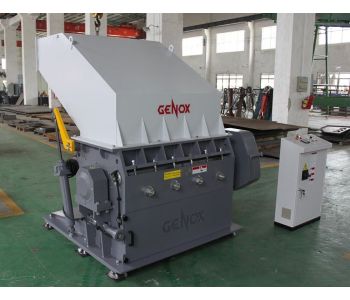In the global push towards sustainability and environmental stewardship, recycling stands out as a cornerstone of responsible waste management. At the heart of recycling processes lies a diverse range of machinery and equipment, each playing a vital role in transforming discarded materials into valuable resources.
Among these machines, granulators emerge as unsung heroes, wielding the power to convert various waste materials into reusable granules, thereby contributing significantly to sustainable practices.
Understanding Granulators: The Mechanism of Waste Transformation
At its essence, a granulator is a machine designed to reduce the size of materials into smaller granules or particles. This reduction process involves cutting, shredding, or grinding the material to achieve the desired size and shape. Granulators come in various types, including:
Plastic Granulators: Specifically designed for processing plastic waste, these machines shred plastic materials into granules, which can then be used as raw materials for manufacturing new plastic products.
Metal Granulators: Used in metal recycling, these granulators break down metal scrap into smaller pieces, facilitating melting and reprocessing into new metal products.
Rubber Granulators: Ideal for recycling rubber tires and other rubber waste, these machines grind rubber materials into granules that can be used in various applications such as playground surfaces or rubberized asphalt.
Wood Granulators: Designed for processing wood waste, these granulators chip or grind wood into small particles, which can be used for particleboard production, biomass fuel, or animal bedding.
The versatility of granulators lies in their ability to handle a wide range of materials, from plastics and metals to rubber, wood, and even electronic waste (e-waste). This adaptability makes granulators indispensable in the recycling industry, where diverse waste streams require efficient processing to unlock their potential as valuable resources.
Applications Across Industries: Harnessing Waste for Sustainability
Granulators find applications across various industries, each harnessing waste materials to create sustainable solutions and products:
Plastics Recycling: In the realm of plastics recycling, granulators play a pivotal role in breaking down plastic waste, such as bottles, containers, and packaging, into small granules. These granules, known as regrind or reprocessed plastic, can then be used in injection molding, extrusion, or blow molding processes to manufacture new plastic products. Granulators enable the circular economy by closing the loop on plastic waste, reducing dependency on virgin plastics, and mitigating environmental impact.
Metal Recycling: Metal granulators are instrumental in recycling metal scrap from various sources, including manufacturing waste, automotive components, and household appliances. By shredding and granulating metal waste, these machines facilitate smelting and refining processes, turning scrap metal into valuable raw materials for metal fabrication and manufacturing industries. Metal granulators contribute to conserving natural resources, reducing energy consumption, and minimizing greenhouse gas emissions associated with primary metal production.
Rubber Recycling: The rubber industry benefits from granulators designed to process rubber waste, particularly tires. Tire granulators shred tires into smaller chips or granules, which can be used in applications such as playground surfaces, sports fields, rubberized asphalt, or as feedstock for rubber molding and manufacturing. By recycling rubber waste, granulators help reduce landfill waste, prevent environmental pollution from tire stockpiles, and promote the sustainable use of rubber resources.
Wood Recycling: Granulators specializing in wood waste recycling transform wood scraps, pallets, and construction debris into wood chips or sawdust. These wood granules find applications in particleboard production, biomass energy generation, composting, and animal bedding. Wood granulators contribute to forest conservation efforts by promoting the reuse of wood waste and reducing deforestation for new wood products.
E-Waste Recycling: Granulators equipped to handle electronic waste (e-waste) tackle the challenge of recycling obsolete electronics, such as computers, smartphones, and appliances. These machines shred electronic components into smaller particles, separating valuable metals like copper, gold, and silver for recovery and reuse. E-waste granulators prevent hazardous materials from entering landfills and promote the responsible disposal and recycling of electronic products.
Environmental Impact: Reducing Landfill Waste and Resource Consumption
The environmental impact of granulators in recycling cannot be overstated. By converting waste materials into reusable granules, granulators contribute to several key environmental benefits:
Waste Reduction: Granulators minimize the volume of waste destined for landfills or incineration, thereby alleviating pressure on waste management infrastructure and reducing environmental pollution.
Resource Conservation: Recycling waste materials through granulation conserves natural resources such as petroleum (used in plastics), metal ores, timber, and rubber trees. This conservation helps preserve ecosystems, mitigate habitat destruction, and reduce the environmental footprint of resource extraction industries.
Energy Savings: Granulators support energy savings by promoting the use of recycled materials in manufacturing processes. Recycled plastics, metals, rubber, and wood require less energy to process compared to virgin materials, leading to lower greenhouse gas emissions and energy consumption.
Circular Economy Promotion: Granulators are integral to the circular economy paradigm, where waste materials are transformed into secondary raw materials, closing the loop on resource utilization and waste generation. This circularity promotes sustainable production and consumption patterns, fostering a regenerative and environmentally conscious economy.
Conclusion: Driving Sustainability Through Granulation
Granulators play an indispensable role in recycling by transforming waste materials into valuable resources, driving sustainability across industries. From plastics and metals to rubber, wood, and e-waste, granulators enable the circular economy, reduce landfill waste, conserve resources, and mitigate environmental impact.
As technologies evolve and innovations in granulation emerge, the future of recycling holds promise for more efficient, eco-friendly, and scalable solutions. By recognizing the pivotal role of granulators in turning waste into valuable resources, we can continue on the path towards a more sustainable and resilient planet.





Comments